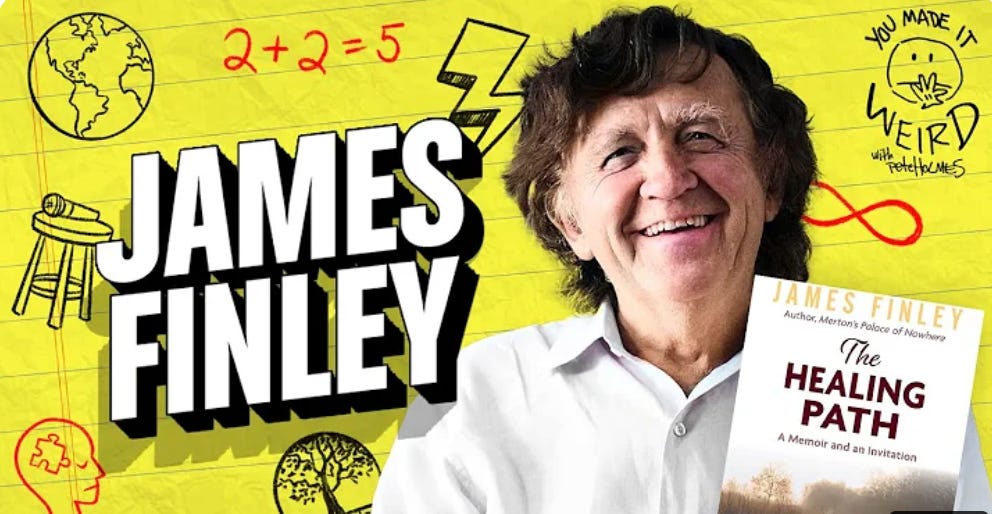Recently an interview of James Finley through my YouTube feed through the algorithm gods. He is was interviewed on Pete Holme’s podcast, “You Made it Weird.”
I first learned of Finley through my friend’s website, TheWorkofthePeople.com and how he was a student of the monk and author, Thomas Merton. Merton is a figure whose work I encountered in seminary and one of his many books, The Seven Storey Mountain, changed the way I thought about spirituality and the Christian faith. Finley was also a monk and then left the monastery and married, divorced, and found his true love of his life, in woman named Maureen. James Finley’s new book is The Healing Path: A Memoir and an Invitation.

One of the things that touched me from the interview was his recounting of the death of his wife. He would walk around in the cry out loud and saying “I loved you so much! I loved you so much!” He was not happy and wanted to die. Eventually he realized that his pain was not about how he loved her so much, but that he she was gone, and he still loved her and that she stilled loved him “from a depth that [he] could barely comprehend.” He continues to share how when he was writing she would sometimes interrupt him for dinner “right on the verge of a deep thought.” But he also thought that “there would be that I will give that I would give anything for you to interrupt me on the edge of a deep thought, but that day has come.”
There have been many times when Paula as interrupted me during my writing progress and a friend once asked why I would let her interrupt me like that, “Don’t you know that it takes a person 15 minutes to get back on track after and interruption?” I mind and don’t mind. There have been many times last year and this year, I’ve had to take Paula to urgent care for something and happy to get the opportunity to do so. I know if I was not here to do it her assistant would, but because I can do it, I will do it. There will be a time that I won’t be able, either because of me or because of her. That is the reality of life and I choose to lean into this reality rather than avoid it. What we have in this world is our fleeting loves. That’s it. That’s all. The more that we explore what this means and how valuable others are in our lives the more we comprehend the value of our own life, and then of life itself.
I’ve stated many times that God is intimately involved in our suffering, so intimate that God suffers with us. God’s own love for us changes God. Because to suffer means to be changed. But it’s difficult to know this reality until we experience the suffering of another and hurt deeply with them. Until that happens, people will be disconnected from us, God’s love for us and our love for others will only we theoretical, only a thought. Finley says that most days “we skim across the surface of our lives” not knowing, experiencing, being willing to open ourselves to this kind of heartbreaking love for us. If we at least sink our feet below the surface, maybe even wade in shallow waters, we may be able to know something that is the mystery of God and the mystery of ourselves. When we glimpse it, then it becomes true faith. But that knowledge says Finley is something we just have to “accept ourselves”; it is inexplicable to anyone else.
I’ve come to deeply appreciate all the people who have come through my life and honored by their presence and friendship. Each meeting, each comment, each word, is a moment of grace, a reaching out of the divine, a chance to heal. However, what I also realized through this interview with Finley is how to hold on lightly to the things we do have. People will move away, friendships will change, we might have great losses, and sometimes easy transitions, but whatever the case we will continue to be sustained by an infinite love that is the source of all things. How do I know this? It is because the mere fact of my existence, my ability to love, my deep grief and gratitude in the love that has been in my life, that I know that this is ever present, overflowing to me and everyone.
It is persistent and overflowing love that brings us here to this moment and every moment after this, every moment before even. It continues throughout my life and into each life. Even in our separateness, we are connected in this way. Trauma, hurt, woundedness, suffering, are all made whole by the balm of love that is continually poured out for us. However, this source is often hidden, by either our ego or ignorance or pain or the doing of others. It is hidden, like a veil, but can be easily revealed through an attempt to contemplate the divine. To “taste and see” God’s goodness. It is in this attempt that we find that our efforts are not sufficient to grasp the ineffable depths of either God or even ourselves, and we simply give in to the infinite love of God.




